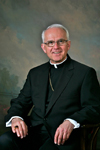Feb. 12, 2014 Over the past generation or two, “Pastoral Ministry” has become a phrase frequently used in the Church. So, what is pastoral ministry? In the simplest of terms, pastoral ministry is what needs to happen in a parish so that all the people may flourish in their faith. Additionally, “pastoral ministry” refers to those who help to make this ‘flourishing’ happen. Our most frequent association with the parish is at Sunday Mass. When parents are blessed with a new baby, they arrange for the Sacrament of Baptism. Children prepare for their First Reconciliation and First Holy Communion. We send our children to the Catholic school or the parish program for faith formation/religious education/catechetical instruction. As children mature into a more adult level of faith, they prepare for the Sacrament of Confirmation. When they fall in love and seek a blessed life commitment, they celebrate the Sacrament of Matrimony. In sickness, the Anointing of the Sick brings comfort and healing. We celebrate these sacramental moments throughout our lives, but pastoral ministry extends even beyond these important liturgical celebrations. Outreach to the needy, counseling the bereaved, visiting the sick, reaching out to individuals with spiritual needs, and adult faith formation are some dimensions of pastoral ministry that extend to the larger parish community. The spiritual and corporal works of mercy are an integral part of the faith life of a parish. In addition to the “visible” ministry occurring in a parish, there is so much taking place in the background. Perhaps, the term “nuts and bolts” best describes this reality: the bookkeeping, dealing with contractors for building and repair projects, making sure that the snow is plowed, the grass mowed, the cemetery maintained, the property cleaned, etc. All of the “et cetera” could fill many pages. But all these activities, both spiritual and temporal, require people. Every parish has a staff, paid and volunteer, with the pastor as the spiritual leader. In years gone by, depending on the parish, the majority of the staff consisted of priests, consecrated religious, some paid lay staff, and many volunteers. The pastor and the curates or assistant pastors or associate pastors (synonymous terms) tended to most of the ministerial responsibilities. Some parishes had sisters who were in charge of the catechetical program. They would coordinate and train the teachers and often make home visits to prepare children for the sacraments. They would help parents in preparing their children for the sacraments. Some parishes had Catholic schools. In the schools, the religious sisters and brothers provided both the religious and secular education for the children. Some schools had lay teachers in addition to the religious, but the lay teachers were a minority. The religious brothers and sisters who staffed catechetical programs and the Catholic schools were often also tasked with other parish responsibilities. They formed an integral part of the parish and willingly mingled with parishioners. Likewise, they were tuned into the needs of the parish and freely helped the pastor respond to those needs. In the past forty years, the needs of ministry have not changed, but those providing ministry have. In this next issue of the North Country Catholic, we will explore the face of ministry today. |
|||||


